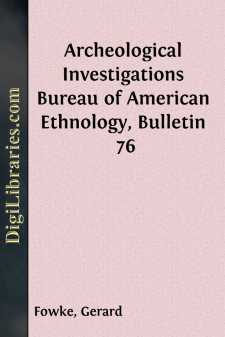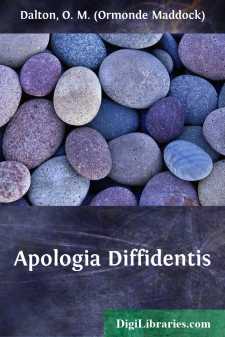Non-Classifiable
- Non-Classifiable 1768
Non-Classifiable Books
Sort by:
by:
John Ruskin
DEFINITION OF THE ART OF ENGRAVING. 1. The entrance on my duty for to-day begins the fourth year of my official work in Oxford; and I doubt not that some of my audience are asking themselves, very doubtfully—at all events, I ask myself, very anxiously—what has been done. For practical result, I have not much to show. I announced, a fortnight since, that I would meet, the day before yesterday, any...
more...
by:
John Milton
They, who to states and governors of the Commonwealth direct their speech, High Court of Parliament, or, wanting such access in a private condition, write that which they foresee may advance the public good; I suppose them, as at the beginning of no mean endeavour, not a little altered and moved inwardly in their minds: some with doubt of what will be the success, others with fear of what will be the...
more...
by:
Gerard Fowke
INTRODUCTION The geological structure of that portion of southern Missouri which lies to the westward of the Archean rocks near the Mississippi River is peculiarly suitable for the development of caverns. The Ozark uplift produced far-reaching undulations, and there seem to have been no violent disturbances which would result in extensive faults, considerable displacements, or a pronounced inclination...
more...
INTRODUCTION. In preparing the second number of our manual for Arbor Day, we have endeavored to keep in mind the fact that Arbor Day was originally designed not as a mere festival or holiday, a pleasant occasion for children or adults, but to encourage the planting of trees for a serious purpose—the lasting benefit of the country in all its interests. As the poet Whittier has so well said, "The...
more...
THE OUTLOOK FOR THE GROWING OF APPLES The apple has long been the most popular of our tree fruits, but the last few years have seen a steady growth in its appreciation and use. This is probably due in a large measure to a better knowledge of its value and to the development of new methods of preparation for consumption. Few fruits can be utilized in as many ways as can the apple. In addition to the...
more...
by:
Edward Brooks
Introduction. Of all writers of speculative philosophy, both ancient and modern, there is probably no one who has attained so eminent a position as Plato. What Homer was to Epic poetry, what Cicero and Demosthenes were to oratory, and what Shakespeare was to the drama of England, Plato was to ancient philosophy, not unapproachable nor unapproached, but possessing an inexplicable but unquestioned...
more...
In the matter of avowals the diffident never speak if they can write. That is why my apology for a furtive existence is here set down in solitude instead of being told face to face. You have borne so many years with my unresponsive and incomprehensible ways that shame at last constrains me to this poor defence; for I must either justify myself in your sight, or go far away where even your kindness...
more...
Locomotion in the Twentieth Century It is proposed in this book to present in as orderly an arrangement as the necessarily diffused nature of the subject admits, certain speculations about the trend of present forces, speculations which, taken all together, will build up an imperfect and very hypothetical, but sincerely intended forecast of the way things will probably go in this new century....
more...
INTRODUCTION English verse allegory, humorous or serious, political or moral, has deep roots; a reprint such as the present is clearly no place for a discussion of the subject at large: it need only be recalled here that to the age that produced The Pilgrim's Progress the art form was not new. Throughout his life Dryden had his enemies, Prior and Montague in their satire of The Hind and the...
more...
by:
Benjamin Lumley
INTRODUCTION. By introducing the reader to "Another World," the Editor does not lead him into a region to which the Earth has no affinity. The Planet to which the following fragments refer not only belongs to the same solar system as our own, but also presents like physical aspects. In it, as here, are to be found land and water—mountains, rivers, seas, lakes, hills, valleys, ravines,...
more...











